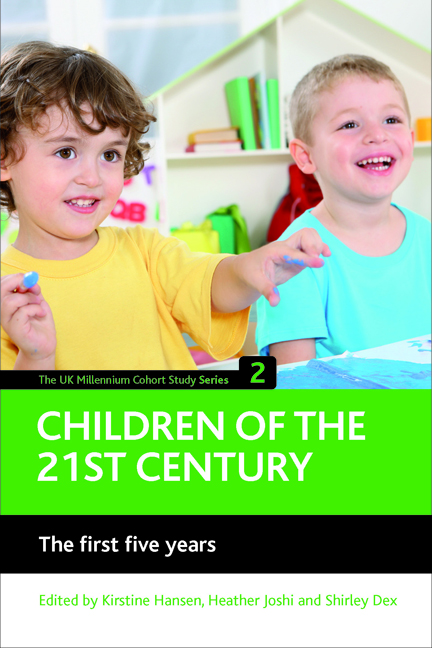Book contents
- Frontmatter
- Contents
- Acknowledgements
- List of contributors
- Glossary
- one Introduction
- two Child poverty in the first five years of life
- three Ethnicity, community and social capital
- four Parental relationships and parenting
- five Partnership trajectories, parent and child well-being
- six Employment trajectories and ethnic diversity
- seven Neighbourhoods and residential mobility
- eight Childcare in the pre-school years
- nine Intergenerational inequality in Early Years assessments
- ten Ethnic inequalities in child outcomes
- eleven School choice
- twelve Teacher assessments in the first year of school
- thirteen Childhood overweight and obesity
- fourteen Resilience in children's development
- fifteen Parental and child health
- sixteen Conclusions
- References
two - Child poverty in the first five years of life
Published online by Cambridge University Press: 01 September 2022
- Frontmatter
- Contents
- Acknowledgements
- List of contributors
- Glossary
- one Introduction
- two Child poverty in the first five years of life
- three Ethnicity, community and social capital
- four Parental relationships and parenting
- five Partnership trajectories, parent and child well-being
- six Employment trajectories and ethnic diversity
- seven Neighbourhoods and residential mobility
- eight Childcare in the pre-school years
- nine Intergenerational inequality in Early Years assessments
- ten Ethnic inequalities in child outcomes
- eleven School choice
- twelve Teacher assessments in the first year of school
- thirteen Childhood overweight and obesity
- fourteen Resilience in children's development
- fifteen Parental and child health
- sixteen Conclusions
- References
Summary
Introduction
The children in the Millennium Cohort Study (MCS) were born around a year after the then Prime Minister Tony Blair announced that it was the government's intention to eradicate child poverty in a generation by 2020. In fact these children are the generation over which it is hoped child poverty will be eradicated. In Figure 2.1 we can see that child poverty fell after 1998/99. However, the government just missed the first five-year target to reduce child poverty by a quarter by 2004/05, and, according to the latest data available, there has been no further improvement.
This chapter explores family poverty in the MCS 3 when the children were aged 5 and traces changes in poverty between MCS 1 and 3, from 9 months to age 5. It is not possible to replicate exactly the measures that the government has been using to monitor the child poverty strategy using the MCS data, however. The MCS collects income data but records the responses in income bands, before housing costs (BHC). Over the three MCS surveys, data on deprivation has also been collected although there are differences between the MCS and the ‘official’ measures based on the Family Resources Survey (FRS) as well as with the nature of the samples. The MCS is a sample of families with a child of a certain age and cannot be used to compare with the results of the Households Below Average Income (HBAI) analysis of the FRS that produces data on the proportion of all dependent children in poverty.
Nevertheless there are a number of reasons why it is important to analyse poverty in the MCS:
• The children are being surveyed repeatedly over their childhood. The MCS therefore represents an opportunity for the analysis of change over time and in particular the persistence of poverty and the factors associated with movements into and out of poverty.
• The children constitute a very large sample that is deliberately stratified to include a large ethnic sample and families living in poorer areas.
• Poverty is an important variable in understanding other aspects of the development and well-being of children. Others who study the cohort children can use the variables created in this analysis.
- Type
- Chapter
- Information
- Children of the 21st century (Volume 2)The First Five Years, pp. 13 - 32Publisher: Bristol University PressPrint publication year: 2010
- 1
- Cited by



